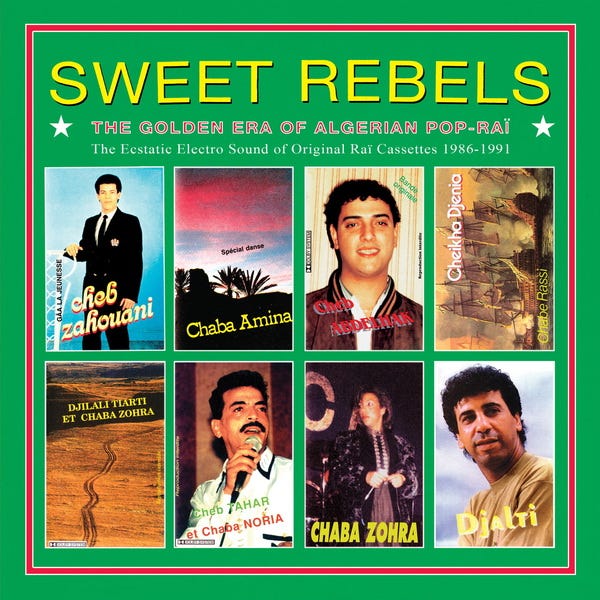Thanks to our new subscribers ! :)
Don’t Call It World Music is a free, independent and curated roundup of music news. Each weekly edition of our newsletter features a handpicked selection of articles related to every kind of music, offering insights into genres from every corner of the globe.
Our mission is to provide visibility to a wide array of issues, musical traditions, artists and genres that are underrepresented or overlooked in mainstream media, generate curiosity and drive traffic to original sources, particularly alternative and independent platforms.
Magical Dancefloor delves into the intricacies of gaining entry to the renowned Berlin nightclub, Berghain. The article draws a parallel between the club's selective door policy and the Berlin Wall, suggesting that the bouncers act as gatekeepers to an "Eden" beyond societal norms.
The Quietus delves into the often-untold story of Central European émigré composers in Britain, highlighting their significant contributions to British musical life despite facing initial cultural conservatism.
Bandcamp Daily illuminates the thriving contemporary music scene in Kinshasa, Democratic Republic of the Congo, highlighting the ingenuity of artists who construct instruments from recycled materials.
Renovatio examines the ancient belief that the deterioration of a civilization's music can foreshadow and even initiate its societal collapse. The article explores Plato's concepts of mousikoi and the significance of musical harmony as a reflection of cosmic order.
Mousikoi ?
For Plato, mousikoi refers to individuals who are not necessarily performers but are deeply knowledgeable about musical theory and philosophy, tasked with upholding the "musical laws" that govern harmony and order in society.
Polyphonic discusses how Dave Brubeck’s groundbreaking jazz album Time Out, released in 1959, significantly impacted the genre through its innovative use of unusual time signatures.
Pitchfork traces the evolution of phonk music, arguing that it has transformed from a tribute genre to 90s Memphis rap into a commercially successful but artistically hollow global phenomenon, dominated by trends like drift phonk and various national iterations on TikTok.
Drift phonk?
Drift Phonk is a high-energy subgenre of Phonk music that emerged in the late 2010s, characterized by distorted basslines, melodic cowbells, and faster tempos, often paired with visuals of street racing and drifting. Originating primarily in Russia, it gained global popularity through TikTok.
Condé Nast Traveler narrates the author's exploration of Nepali folk music in Kathmandu, discovering surprising parallels with American bluegrass. The article documents jam sessions with nomadic Gandarbha musicians, noting similarities in instrumentation, musical scales, and song structures.
"If you lose the percussion, it sounds like American Appalachian music."
It's Psychedelic Baby Magazine unveils the history of Weird Herald, a late 1960s folk band from Los Gatos, andecounts their formation, musical influences (including psychedelics), and the reasons behind their music remaining largely unreleased until now.
The Quietus commemorates the 30th anniversary of Ol' Dirty Bastard's Return To The 36 Chambers: The Dirty Version. The article shares insights into ODB's eccentric personality, his innovative vocal style, and the album's groundbreaking approach to hip hop, emphasizing his fearless creativity.
"Kanye West said he’d cut a piece of his finger off just to have that voice."
Passion of the Weiss features an interview with Ghanaian music icon Ebo Taylor. The article explores Taylor's profound impact on Highlife music, his fusion of traditional Ghanaian rhythms with jazz and funk, and his perspective on the spiritual nature of music. It highlights the influence of older rhythmic patterns—such as palm-wine, osibisaaba and Akan traditional styles.
Osibisaaba?
Osibisaaba is a traditional music genre originating from the Fante people of Ghana, characterized by a fusion of their percussive rhythms and seperewa harp-lute melodies with the finger-plucking guitar style introduced by Kru sailors. It later influenced highlife music.
NHK WORLD-JAPAN introduces the duo yano et agatsuma. It outlines the distinguished careers of pianist/vocalist Yano Akiko and virtuoso Agatsuma Hiromitsu, emphasizing their work to create a "new" traditional Japanese music rooted in folk melodies and incorporating piano, shamisen, and electronic.
Shamisen?
The shamisen, is a traditional Japanese three-stringed instrument resembling a lute, characterized by its long neck and small rectangular body covered with skin. Played with a large plectrum called bachi, it is integral to various Japanese musical styles, including kabuki theater, bunraku puppet performances, and folk music.
Afropop explores the music and messages of female artists in Madagascar. The article delves into the themes prevalent in their lyrics, often focusing on female empowerment, social issues, and political commentary.
Poverty reached a record level in Madagascar in 2023 according to the World Bank, with more than 80% of the population of 30-million souls living below the threshold of $2.15 per day. Poverty is therefore logically the topic of many songs.
In her hit, Bleu-Bleu, the tsapiky Mirasoa criticizes jealous people who criticize those who are rich and “shine blue,” evoking the color of the local 20,000 Ariary note (equivalent to 5 dollars).
Tsapiky?
Tsapiky is a dynamic musical genre from southwest Madagascar, originating in the 1970s as a fusion of South African pop influences and traditional Malagasy music. Characterized by fast, jerky rhythms and energetic guitar riffs, it is often performed at ceremonies creating a trance-like atmosphere.
V&A Blog introduces artists participating in the "Sound Clash" event aimed at reviving and exploring the sonic history of east London. The article outlines illegal raves, sound clashes, and pirate radio in the 80s and 90s, and how urban redevelopment has impacted these subcultures.
Far Out Magazine presents a thought-provoking opinion piece that critically examines the notion of talent in relation to Captain Beefheart, questioning whether his undeniably original and avant-garde sound was a product of deliberate artistic vision or simply a reflection of untrained musicianship.
"Trout Mask Replica is an impenetrable album that defies all classifications because it often sounds like three songs playing simultaneously. The strangest thing is, this was all deliberate on his part."
The Costa Rica News explores the profound spiritual and cultural heritage of Costa Rica's indigenous communities. It details various significant celebrations, such as the Fiesta de los Diablitos of the Boruca people, the sacred cacao ceremonies of the Bribri, and the Day of the Ancestors observed by the Maleku.
The Korea Times details the performances of Yang Yu-Chiao in South Korea. The article describes his unique performance style, which incorporates onomatopoeia, traditional Korean instruments like the "kkwaenggwari" hand drum, and visual elements such as drawing on blackboards.
The Marsh family uploaded "I Put Up Tariffs”, a parody based on “I shot the sheriff” by Bob Marley. The song discusses Trump's penchant for slapping tariffs on friendly trading partners in his first 100 days at the White House.
Eurasia Review reviews Masato Tani's book which delves into traditional Iranian music and the profound impact of its oral tradition on notions of improvisation, originality, musical freedom and mphasizes how the absence of musical scores shapes the very understanding of a musical idea and the performer's contribution.
Boomkat presents "Sweet Rebels" by Various Artists, which compiles Algerian Raï music from the 80s and 90s. The article emphasizes a golden era where traditional Algerian sounds met electronic music, resulting in "heart-on-sleeve" bangers that gained popularity in Paris and influenced UK hardcore.
BrooklynVegan announces the upcoming film PAVEMENTS, directed by Alex Ross Perry, about the iconic indie rock band Pavement.
Bibliolore presents an annotated bibliography that focuses on the diverse landscape of underground youth music within the Arab world.
Medievalists.net explores ten musical instruments that were played across medieval Europe, highlighting their appearance, use, and cultural significance.

Albumism reflects on the 55th anniversary of Miles Davis's Bitches Brew, analyzing its revolutionary role in the development of jazz fusion.
Another Thought recounts the author's personal journey of discovering and appreciating Cindy Lee's album Diamond Jubilee.
The Twelve Inch examines the significant impact of the track "Jack to the Sound of the Underground" by Hithouse on the development of Dutch DJ culture and dance music in the late 1980s
Interlude announces the inaugural studio recording of Juraj Beneš’ Suite for Piano No. 2, Old Boys Anthology by Ivan Šiller. The article positions Beneš' forty-minute composition as an exceptionally challenging piece for the pianist, while also offering intricate and rewarding listening experiences.
"Is Juraj Beneš’ Old Boys Anthology the Hardest Piano Piece of All?"
The Quietus asserts that Can's trilogy of albums—Tago Mago, Ege Bamyasi, and Future Days—stands as the unsurpassed pinnacle of krautrock.
Punch Newspapers reports on the 60th birthday of Adewale Ayuba, a highly regarded Fuji music icon. The article highlights his impact on the Nigerian Fuji music genre, his prominence within the Nigerian social and cultural sphere since his debut at a young age, and the widespread acclaim of his 1991 album Bubble.
Fuji?
Fuji music is a genre of Yoruba popular music from Nigeria, characterized by its energetic and lively rhythms, intricate percussion patterns, and call-and-response vocal style, often incorporating elements of Islamic and Yoruba traditions. It emerged in the 1960s, evolving from wéré music.
This ACFM podcast epidode is all about acid – as a drug, a music genre, a political concept, a mental tool and a thought corrosive - and decides if ‘acid’ is still a useful way of thinking about leftwing politics.
With music from Tricky, Pink Floyd and Phuture, they discuss anticapitalism, Acid Corbynism, Rimbaud, acid rock and more.










man this substack is an incredible resource. what a service, thank you.